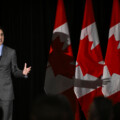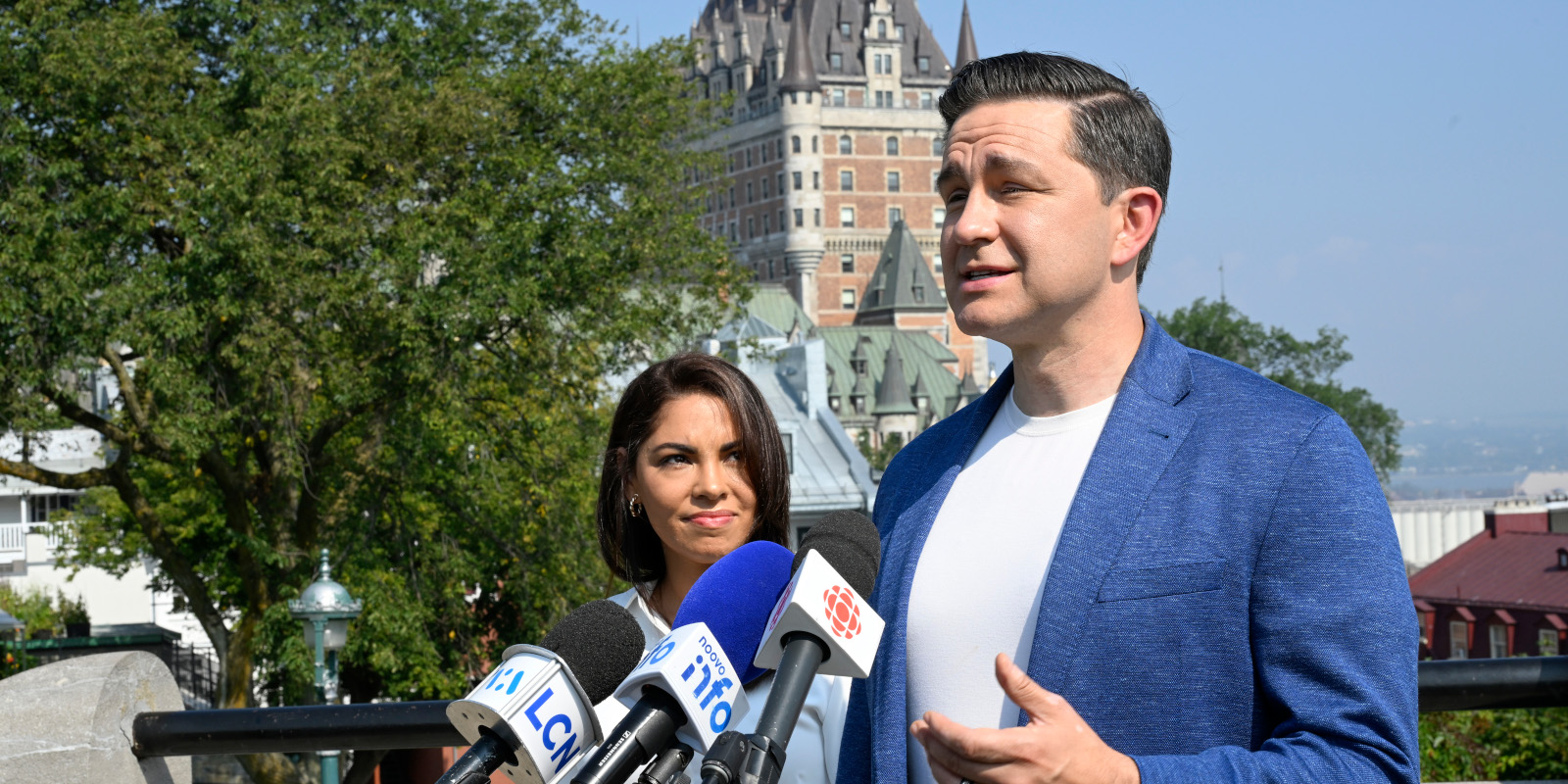Droves of card-carrying Conservatives are gathering in Québec City for the party’s annual convention, which will be the first since Pierre Poilievre became leader last year. Polls throughout the summer have suggested that support for the governing Liberals has fallen critically in every province, except for Québec.
A recent Leger poll in the province pegged the Liberals at 30 percent, a small climb down from the 33 percent of the vote share that they won in Québec in 2021, while the Conservatives remained at 18 percent, the same percentage of votes they won there in 2021. The Conservatives currently hold just 9 of 78 seats in Québec.
Philippe Fournier, a polling analyst and founder of 338Canada, says the Conservatives can win a majority government without more seats in Québec, as demonstrated in 2011, but cautions that the election that year was an anomaly.
“If you cannot win at least a dozen or 15 seats in Québec, it makes your path to a majority to a Conservative majority that much harder,” says Fournier. “If the Conservatives were to go up a bit in Québec, but not much, a few points more, they could take a few Bloc seats and maybe a few Liberal seats in the rural regions, and suddenly your path to victory becomes far easier.”
Poilievre will be the most high-profile speaker at the convention, but Fournier says he cannot deliver a speech in English where he only bashes the governing Liberals, and then simply translate those same words into French if he wants to boost the party’s fortunes in Québec.
“His first opponent in Québec is not the Liberals,” says Fournier. “If the Conservatives are to win many more seats in Québec, it will be mostly at the expense of the Bloc Québécois, so it’ll be interesting to see if he takes aim at Yves Francois-Blanchet, or if he just gives the same speeches about everything being Trudeau’s fault.”
Earlier this week, Poilievre wrote on X in French that voting for the Bloc would lead to higher taxes on gasoline, leading to speculation he is actively targeting the Bloc’s base to peel off new votes. The same day, Poilievre even went further and criticized Blanchet directly.
An analysis written by Fournier in the aftermath of the 2019 federal election found that the Bloc outperformed the Conservatives in areas won by the Coalition Avenir Québec (CAQ) in the 2018 provincial election.
The 2018 election was the first contest since 1970 to be won by neither the federalist Québec Liberal Party (PLQ) nor the sovereigntist Parti Québécois (PQ).
Led by former PQ cabinet minister Francois Legault, the CAQ promised a middle ground of greater autonomy for Québec, instead of sovereignty, along with moderately centre-right policies. The CAQ won a majority government in the 2018 election and was re-elected in 2022 with an increased majority.
Frédéric Boily, a professor at the University of Alberta specializing in Canadian and Québec politics, says that many potential voters still remain within the CAQ.
“The CPC could appeal to ‘autonomist’ voters, who are nationalists but not necessarily sovereigntists,” says Boily.
In addition to appealing to autonomists, Boily says the Conservatives can also win more votes in Québec by attacking the Liberals’ economic record and denouncing what he describes as their excessively ‘woke’ advocacy and embrace of identity politics.
Boily says however that the Conservatives should avoid appealing to somebody like Mathieu Bock-Côté, a right-wing nationalist who explicitly advocates for Québec’s independence from Canada, rather than more autonomy. He says dialogue between someone like Bock-Côté and Canadian Conservatives is difficult because Québec conservatives tend to be nationalists in a way similar to their counterparts in France.
“In my opinion, Conservatives would waste time appealing to nationalists as well as risk losing some votes in English Canada,” says Boily.
The Hub‘s editor-at-large, Sean Speer, who recently interviewed Bock-Côté in a Hub exclusive, thinks these questions may be as much about semantics as anything else.
“Call it decentralist, provincialist, or even autonomist or nationalist, there’s clearly some overlap between the Conservative Party’s predisposition to decentralized federalism and the current Québec mood in favour of greater control over its own governance—particularly with regards to culture and language,” says Speer. “Poilievre and the Conservatives should generally countenance that instinct especially if the same treatment is extended elsewhere. My sense is that the Trudeau government’s top-down federalism is creating interesting bedfellows across the country.”
Yet, Dan Delmar, a Québec-based radio host and occasional Hub contributor, says there is a stark difference between the Anglophone and Francophone political traditions, which impedes the Conservatives in Québec. He points to the provincial Conservative Party of Québec, whose leader Éric Duhaime presented a populist platform in the 2022 provincial election that emphasized many libertarian ideals but failed to win any seats.
“The cultural difference between the Anglo tradition of personal liberty and the Franco tradition of collective rights in policy and in public pronouncements matters a lot,” says Delmar. “Being hands-off with Québec may be politically convenient and please some nationalist pundits but it probably won’t motivate a significant number of Québec voters to go Conservative.”
Like many other pundits, Fournier says the federal Conservative ceiling in Québec can also be partially attributed to its favourable stances towards oil and gas production and its opposition to carbon taxes.
Québec’s energy needs are almost entirely produced by hydroelectric power, and Fournier says pro-oil policies do not resonate the same way in Québec as they do in Western Canada. He also says that because Québec falls outside the federal carbon tax regime due to its carbon cap and trade deal with California, promising to repeal the carbon tax also has little appeal in the province.

Historically, the former Progressive Conservative Party, one of the modern Conservative Party’s two legacy parties, enjoyed its greatest electoral triumphs when it dominated Canada’s only majority French-speaking province. It won the vast majority of Québec seats in 1984 and 1988 when it was led by the Québec-born Brian Mulroney.
“When the party was the PCs led by a Québecer, they had a lot of success here because that cultural gap was bridged,” says Dan Delmar. “Poilievre’s spouse being a Québecer doesn’t hurt, and his command of the language isn’t terrible, but there’s little other common ground between him and the median voter.”
Emulating the success of the PCs in Québec has been a challenge for the modern Conservative Party, and some pundits have asserted the party should focus on growing elsewhere, but Fournier says there is room for modest growth.
“Whether they are up or not remains in the air, but they’re not down,” says Fournier. “We don’t see a polling at 11 or 12 percent, we see 18, 20, 22, which would be enough to maybe pick up a couple of seats, maybe an additional one in Québec City, but there’s no huge harvest on the horizon with those numbers.”
Like Fournier, Delmar guesses that the Conservative ceiling under Poilievre would be roughly 20 seats and that the Bloc will win a plurality of seats in Québec during the next election.
In the last election, Québec Premier and CAQ leader Francois Legault endorsed Poilievre’s predecessor Erin O’Toole due to his willingness to expand the province’s autonomy, which the other parties did not.
Legault’s autonomist policies have included calling on Ottawa to let Québec regulate areas like immigration, language, secularism, and education without federal interference. However, Legault’s endorsement ultimately counted for little as the Conservatives gained no new seats in Québec.
Recommended for You

The Notebook by Theo Argitis: Carney’s One Big Beautiful Tax Cut, and fresh budget lessons from the U.K.

Ginny Roth: How vacant liberal nationalism left Canada worse off than George Grant even imagined

Peter Menzies: Justin Trudeau’s legislative legacy is still haunting the Liberals

‘Our role is to ask uncomfortable questions’: The Full Press on why transgender issues are the third rail of Canadian journalism




